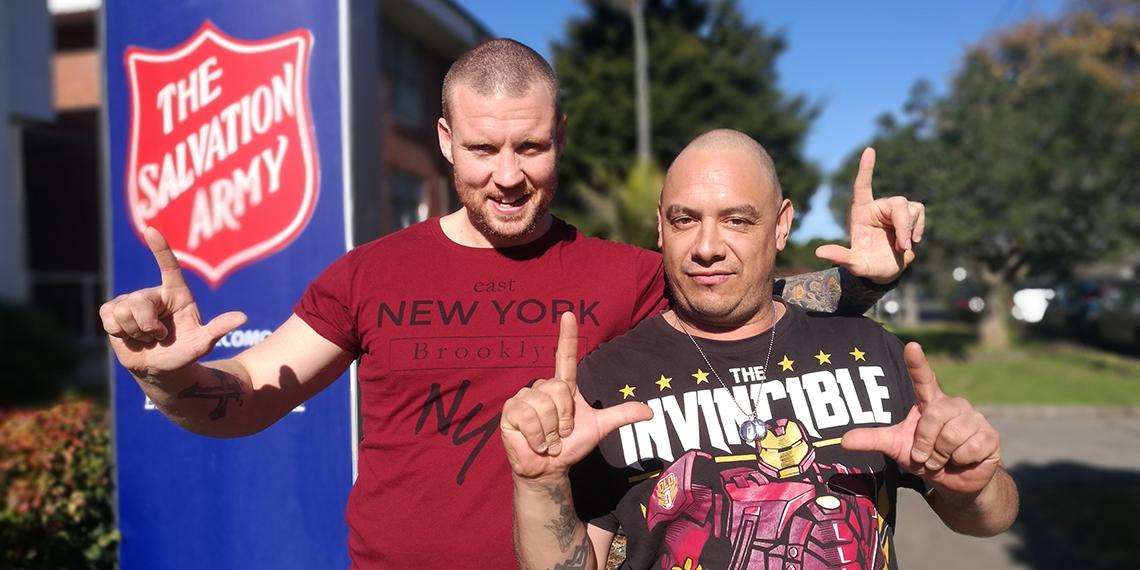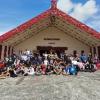Beyond the prison gate

Epsom Lodge is one of the last remaining ‘Prison Gate’ homes, a ministry that began in 1884 by The Salvation Army’s New Zealand founder George Pollard. It was set up to help ‘destitute men’ leaving prison. Today, Epsom Lodge is finding innovative ways to go above and beyond this timeless vision.
‘Mike’ spent two years sleeping rough on the streets of Auckland. Homelessness is not only an uncomfortable reality, but a dangerous one. For Mike, drug use quite literally provided the comfort that enabled him to sleep, suppressing his physical discomfort and fear for his own personal safety.
Eventually, Mike courageously suffered through a week of poor sleep and paranoia to get himself clean enough to pass the required drug test for admission to Epsom Lodge, The Salvation Army’s largest Supportive Accommodation facility, located in Central Auckland.
‘We could think that people like Mike will never use again, but we must recognise that drug use isn’t always about drug use—it can be about coping with a bigger problem, like homelessness. It’s a process of tackling one problem at a time,’ explains Auxiliary Captain Eric Turner—together with fellow officer and wife Julie, the Turners are the current Directors of Epsom Lodge.
Out of options
So, what is Epsom Lodge? Since it was established in 1897 as a home for men released from prison, Epsom Lodge has grown in its scope and vision to become truly ‘supportive accommodation’.
It is supportive in that residents are genuinely cared for and can access various support services directly through staff and caseworkers. And it is accommodation for those who find themselves with nowhere to live for a variety of reasons.
‘Our main work is with the homeless,’ Julie explains, ‘but it is transitional supportive accommodation that we provide. There are 70 beds for men, 15 for women, and most residents stay for between 3–6 months.’
So, for some doing the non-residential stages of The Salvation Army’s Auckland Bridge programme (drug and alcohol rehabilitation) in Mt Eden, Epsom Lodge and its staff provide supportive accommodation for that short-term period. It also provides a ‘first address’ for those being released from prison who need support as they reintegrate into society.
For many residents though, it is quite simply a last resort when all other accommodation options have been exhausted.
When you consider the complex background many of the residents bring to their stay at Epsom Lodge it’s amazing it works,’ Eric explains. ‘All these different people in the one space, complex backgrounds and affiliations and views, diverse cultures and ethnicities, the huge age range, and of course, the addition of the women’s wing—it shouldn’t work, but by the grace of God, somehow it does.’
When Julie and Eric Turner were appointed as Directors of Epsom Lodge, they quickly found the motto of ‘soup, soap and salvation’ was very real.
‘Here at Epsom Lodge people often have open ears to God and spirituality—people who would never walk into a church. We are able to speak hope into the lives of people who really need it and give them a vision of a different life, a transformed life,’ says Julie.
‘It’s hard, very hard, at times, to hear what people are going through, but I’m so thankful to God for the chance to start conversations about what could change, and to provide support towards life transformation.’
Affirming identity
One of the innovative approaches at the Lodge has been the investment in an additional staff member, to analyse the demographic of residents coming to Epsom Lodge. This revealed that 45 percent identified as Māori. For Eric, it’s a ‘no brainer’ to provide pathways for residents to discover (or re-discover) their cultural heritage.
‘As Christians we know that exploring and affirming our identity is part of our formation in Christ. Many of the residents have become disconnected from their culture through the debilitating effects of colonisation. Add addiction and criminal behaviour to that disconnect, or poor mental health—and, of course, homelessness—it’s no surprise identity has taken a huge knock. Shame is a big factor too, so we want to do all we can to support residents as they affirm their identity.’
Every week, a mihi whakatau (welcome) takes place to mark the arrival of new residents to the whānau. ‘We had a recent resident who told me that he had never had anything spiritual happen in his life—he didn’t believe in any of it. Then he walked into Epsom Lodge and was confronted with spirituality at the get-go. Karakia is part of the mihi whakatau and so he began to question everything he’d ever known from day one. He now says he has found something bigger than himself and wants to know more.’
Undeserved generosity
Manaakitanga is also a key practice. ‘It’s about inviting people into the whānau and treating them with the same care and respect as you would any family member. Where manaakitanga differs to good old kiwi hospitality is the extent to which generosity undergirds every action.
‘It’s about going above and beyond, and it’s not just about food. When our team practise manaakitanga we are offering something that is not earned or deserved—it encompasses and displays grace,’ Julie explains.
‘At our Christmas party last year, we had a resident who’d been in prison for the past eight Christmases. He received a gift—nothing much really—but he had forgotten what it felt like to get a gift,’ Eric explains. ‘Turns out he hadn’t had a Christmas present since he was about nine years old. He physically struggled to accept the gift—tears welled up and he said, “I don’t know what to do Eric, it’s been so long since I’ve had this.” A huge part of manaakitanga is doing celebrations like Christmas well and with meaning.’
However, manaakitanga also demands that the safety of the whole whānau comes before the negative or destructive behaviour of the individual. One of the hardest things Julie and Eric face is having to ask someone to leave. ‘We have to balance grace for the individual with manaakitanga for the whole house,’ Julie says with an uneasy smile.
Supporting Wahine Toa
The addition of the Wahine Toa wing five years ago, provides a safe place for women who are escaping domestic violence or experiencing homelessness.
‘Cilla is just 20, and was using cannabis so she could get to sleep at night, because she was sleeping in her car. It’s not that she was an addict per se, but she was using as a means of coping with the fear resulting from homelessness,’ Julie explains.
A dedicated Women’s Care Worker, Courtney Frankland, works one-to-one with women and sees a lot of positive outcomes. The women’s wing is off limits to all men. But just like the men’s wings, there are communal spaces for women to gather together. Envoy Jillian Smith runs a sharing group twice a week that explores spirituality and faith using the Bible as a base.
While some were concerned about the addition of the Wahine Toa wing and the safety of women, it has changed the dynamic of the Lodge for the better. ‘People thought the men would go a bit crazy, but actually behaviour has settled down because the presence of women has “normalised” the environment. The women are respected as sisters, mothers and daughters so it’s positive,’ Eric affirms.
Committed to the cause
The Turners are very firm about giving credit where it’s due—to God, and of course, to the staff. ‘The staff here are truly amazing,’ Julie affirms. ‘The way they care about the residents reveals the size of their hearts and commitment to the cause.’
Julie explains that Bernadette Collins has been the Business Manager since ‘before the internet’, which means over 20 years! Jenny Kelly from Glen Eden Corps has been the Administration Assistant for nearly a decade. ‘She stays because she believes in the mission of the place.’ And there are plenty of others, like Operations Manager Jonathan Kirkpatrick who has clocked up five years.
Reintegration Caseworker Andrea Page has been with the team for just over two years and works with people who are at the bottom of the social ladder. ‘This place believes in them and gives them another chance, by providing space to adjust to life outside prison. I really love the opportunity I have to be part of that change and see personal growth,’ Andrea says with a huge smile on her face.
Julie has high praise for Andrea’s work, explaining that ‘Some residents who have been in prison for a long time have never used a smart phone. Some have no bank account or ID. Technology has marched on at such a pace that even accessing a benefit can be mystifying, as the process is done online now. Andrea does this upskilling, practical support work, as well as helping facilitate whānau reconciliation in some cases’.
All these amazing humans bring their professional skills to a lavish table, offering life transformation and hope to residents.
Disturbing the present
But what really pulls on Julie and Eric’s heart strings, and causes staff great angst, is what happens when a resident leaves Epsom Lodge. ‘It’s a celebration sometimes as people move on, but often it’s cause for real concern,’ Julie says.
A key strategic partnership exists with the Mt Eden Bridge Recovery Church because this is the space where people leaving Epsom Lodge feel most welcome and at home.
Ever since the Booths began Sunday services for people who weren’t accepted in the mainstream churches, this has been the heart of The Salvation Army, says Territorial Commander Commissioner Andy Westrupp.
‘I am constantly encouraged in seeing examples of Salvation Army mission to people who have been marginalised by circumstances they cannot control. I believe our founders William and Catherine Booth would be amazed to see how their vision of “soup and salvation” has been interpreted and adapted into our modern world. Epsom Lodge, with its links to local corps and Recovery Church, is a fine example of this adaptation,’ says Andy.
The Army is still called to be a place where everyone feels safe and welcome. We must continue to be a church where people don’t need to look a certain way or behave a certain way, before they are allowed to belong.
‘Many of our residents know their past decisions have had negative impact on family or society, and as a result, some genuinely want to give back. They don’t want a church they can just go and sit in, they want to serve in meaningful ways,’ says Julie.
Andy agrees that we must never abandon those whom William Booth described as ‘our people’.
‘I believe God raised up The Salvation Army, alongside sister churches, to face towards those people who struggle to fit in most places. With open hearts and hands we need to offer the love of God with both soup and the gospel. This is who we are,’ he says.
Founders’ Day gives us the opportunity to celebrate our past, as well as ask the brave questions that keep us true to our calling: How can we effectively fulfil our purpose today? Who are the unseen and the marginalised in our culture? How can we stand with them and offer them hope?
Let’s continue to ‘disturb the present’ and a future for everyone within our Army. After all it’s not about us—it’s about others.
By Jules Badger (c) 'War Cry' magazine, 29 June 2019, p6-9 You can read 'War Cry' at your nearest Salvation Army church or centre, or subscribe through Salvationist Resources.
